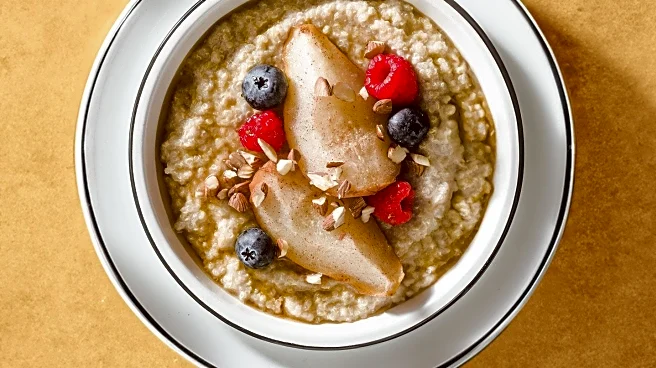What's Happening?
The UK government has postponed the implementation of a ban on advertising porridge oats, initially set for October, now rescheduled for January 2026. This decision is part of a broader initiative targeting foods deemed less healthy, including porridge oats, granola, and ready-to-eat cereals, under a scoring system assessing salt, fat, sugar, and protein content. The classification of porridge oats as 'junk food' has sparked controversy, with only 2% of surveyed individuals agreeing with this label. Experts argue that oats are beneficial due to their beta-glucan fiber, which improves cholesterol and gut health, and their micronutrients like manganese, phosphorus, magnesium, and B vitamins. Despite concerns about blood sugar spikes, nutritionists suggest pairing oats with protein and healthy fats to balance this response.
Why It's Important?
The delay in the advertising ban highlights ongoing debates about food classification and health impacts. Oats are recognized for their health benefits, including cardiovascular risk reduction and gut health improvement. The controversy underscores the challenge of categorizing foods based on health metrics, which can influence public perception and dietary choices. The ban aims to reduce exposure to foods high in refined sugars and processed ingredients, particularly for children and teenagers, whose long-term health habits are being shaped. The discussion around oats reflects broader concerns about ultra-processed foods and their role in public health, emphasizing the need for nuanced dietary guidelines.
What's Next?
The advertising ban is set to take effect in January 2026, potentially impacting marketing strategies for breakfast cereals. Stakeholders, including food manufacturers and health advocates, may engage in further discussions to address the classification of oats and other foods. The government may face pressure to reconsider its scoring system or provide clearer guidelines on healthy food advertising. As the ban approaches, public and expert opinions may influence policy adjustments, aiming to balance health promotion with consumer choice.
Beyond the Headlines
The debate over porridge oats highlights ethical considerations in food advertising and public health policy. The classification of oats as 'junk food' raises questions about the criteria used to evaluate food healthiness and the potential stigmatization of nutritious foods. This situation reflects broader societal challenges in addressing childhood obesity and promoting healthy eating habits. The delay in the ban provides an opportunity for stakeholders to reassess the impact of advertising restrictions on consumer behavior and health outcomes.










